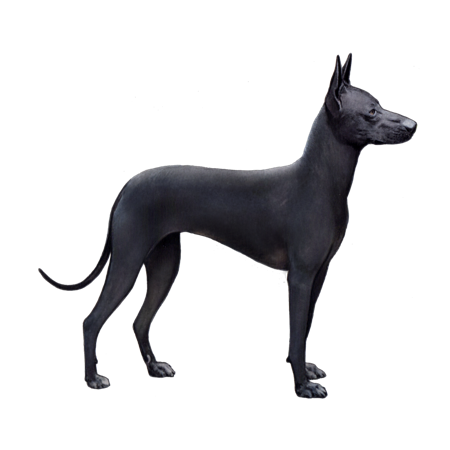
Peruvian Inca Orchid
Intelligent and elegant, the Peruvian Inca Orchid makes a good hunting dog and affectionate family companion. Though the breed comes in a coated variety, hairless Orchids are the most common—and the most memorable.
Interested in discovering if your dog is a Peruvian Inca Orchid?
Check out Wisdom Panel's DNA tests.
Peruvian Inca Orchid Traits
General Appearance
Peruvian Inca Orchids are unique-looking sighthounds with an elegant, slim build. They come in small, medium, and large sizes and can be hairless (the most common type) or coated. The hairless variety almost always has an incomplete set of teeth.
Coat and Colouring
Hairless PIOs have just a few short hairs on the head and small patches on the lower tail and feet. Their skin can be any solid color or spotted with unpigmented areas.
The coated variety's hair length is short or medium with feathering on the neck, ears, and body. All coat colors are accepted under the breed standard.
Distinctive Physical Traits
PIOs have alert, intelligent expressions and strong, muscular bodies. Hairless Orchids feature “prick” or upright ears when on alert, whereas the coated variety has only semi-prick ears. Both types have low-set tails that the dogs carry raised in a round curve above the back when excited.
Peruvian Inca Orchid Temperament
Peruvian Inca Orchids are loyal dogs and very affectionate with their humans. They can, however, be wary around strangers and aren't the best choice for families with very small (and thus unpredictable) children.
These playful pups enjoy trips to the park and outings with the family. But they're not well-suited for full-time life outdoors. They also require early socialization and training to help them develop into well-mannered, predictable pets.
Sighthounds like the PIO can have a strong prey drive and are very fast. So, they should be supervised when around cats and other pets and kept on a leash if any animals they might mistake for prey are nearby.
Peruvian Inca Orchid History
The Peruvian Inca Orchid (PIO) is an ancient breed that dates as far back as 350 BC. Evidence of these dogs appeared on Moche, Chimu, Chancay, and Incan pottery. Interestingly, their urine was used in medicine and their body warmth was used to treat arthritis and respiratory conditions. On top of that, some people believed the breed brought good luck. Not bad for a little hairless dog!
After the Conquistadors overtook Peru, breeders crossed these small pups with larger dogs from other countries. And over time, this process resulted in the three distinct breed sizes that exist today.
Jack Walklin brought eight dogs from Peru to America in 1966 and used them to establish the breed—which he dubbed the Peruvian Inca Orchid—in the U.S. The PIO has been registered with the FCI since 1981 and has been eligible to compete in the AKC's Miscellaneous Class since 2011.
Peruvian Inca Orchid Care
Nutrition
Peruvian Inca Orchids thrive on high-quality food that's appropriate for their life stage. To help your dog maintain their slim physique, keep an eye on the amount of food you give them. And don't forget to account for treats. Ideally, they should make up no more than 10% of a dog's daily calorie intake.
Grooming
Hairless Orchids don't require brushing, of course, but they do still need occasional baths to stay clean. They also should wear sunscreen to protect their skin when outside on sunny days.
Coated Orchids need weekly brushing to remove loose fur and keep them looking their best. Both types need regular nail trims and ear cleanings as part of their standard care.
Lastly, good dental hygiene will support your dog's overall health. Dental disease is one of the most common health conditions in adult dogs. Left untreated, it can contribute to other serious issues. In addition to professional cleanings, establish an at-home dental care program that includes regular teeth brushing and veterinarian-recommended dental chews.
Exercise
PIOs are energetic dogs that need daily exercise to stay in tip-top shape. Backyard play sessions, brisk walks, and games of hide-and-seek are all good ways for them to stay active. They also enjoy—and are good at—agility, lure coursing, and rally work.
Training
Though intelligent, Peruvian Inca Orchids can be difficult to train. They require a firm, consistent approach that uses positive reinforcement to reward desired behaviors.
Breed Group
Terrier
The Terrier Group ancestors were bred to hunt and kill vermin. They are often characterized as feisty and energetic dogs whose sizes range from fairly small to much larger.
Resources
https://www.akc.org/dog-breeds/peruvian-inca-orchid/
http://cdn.akc.org/PeruvianIncaOrchid.pdf
Reviewed 9 July 2021 by Jamie Freyer, DVM





















































